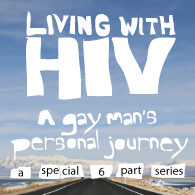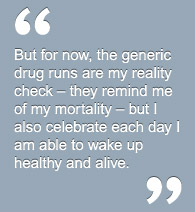It is a known fact that HIV is not a curable disease. Patients who go on medication have to take it for the rest of their lives in order to suppress the virus in the body, preventing it from further weakening the immune system.

Anti-Retroviral Therapy – or ART, consists of a cocktail of drugs a patient takes each day to stop the virus from replicating in the body. I went on ART when the drugs were made available in Singapore in 1995. ART does not work successfully for an indefinite period. The virus, usually after a few years, will mutate and become resistant to the drugs. That is why monitoring blood levels are so important – if the drugs you are taking start to become less effective, the results will show up in your blood work. And this means you will have to change your drug combination for treatment.
Once ART was introduced, first in the West, the results were dramatic. People stopped dying – and got healthier… hospices that were previously full were now empty. Many patients got well enough to go back to work and live fairly normal lives. HIV slowly morphed from a death sentence into a disease that could be chronically managed.
The days when HIV patients were pictured as gaunt and dying are no more. But in place of this is a picture of complacency – many think that HIV patients can now take their medication and everything will be fine. But there is more to this picture.
In those days, I used to take a combination of three kinds of drugs – and I had to faithfully take them three times a day. If I did not – and do not – adhere to this strict regimen, the likelihood for drug resistance would increase. I tried counting the number of pills I had to take once – and stopped counting after I reached 20. Some pills were as big as a fifty-cent coin and I would have to swallow a handful of these each time. Gagging on these pills was not uncommon.
Whenever I had to take my mid-day batch of pills, I had to sneak off to the rest room to swallow them.
In addition to developing the discipline to stick to your drug regimen every day – there were the side effects, which affected different patients in different ways.
I remember getting diarrhoea each time I took a certain type of drug. Thankfully my body got used to it – but only after two months. Another one gave me nausea after awhile – I would suffer from dry heaving for no reason – and I had to eventually forsake it and switch to another drug. There is a limited choice of drugs available for treatment – so each time you get drug resistance, it means there is one drug less you can use – and eventually there won’t be any more available to treat you. That is the reality I have to live with each day.

I have seen cases where a family – husband, wife and two children – were all infected. They could not afford treatment for all, only for two. The parents had to make the heartbreaking decision on who in the family the family would get treatment, and who would be denied it. It is times like these when I think: “Life sucks”. No one should have to make that kind of horrible choice.
Till today, Singapore does not provide subsidies for medication for these life-saving drugs. Fortunately, there are now affordable alternatives for patients here – in the form of generic drugs produced elsewhere.
Governments in Brazil and Thailand produce ART drugs for their own people. Private companies in India are also producing generic drugs. The contentious issue of Intellectual Property Rights claimed by the pharmaceutical companies have kept prices very high – and ART drugs were largely unaffordable by more than 90% of the world’s HIV population in the 1990s. But with World Trade Organisation (WTO) negotiations and the global manufacture of generic ART drugs, millions are now getting treatment – including the hundreds of patients who would otherwise not have been able to afford it in Singapore.
I am profoundly grateful to the Kingdom of Thailand – the government there produce their own generic drugs and even innovated the three-in-one pill – including three ART drugs combined into one single tablet to be taken twice a day.
I travel regularly to Thailand to buy these generic, life-saving drugs. These have been keeping me alive for the past few years… and I know many more Singaporeans who also take these generic drugs. Every time I make my drug pilgrimages to the Land of Smiles, I am humbled.
I know I not only owe my life to my medical caregivers – I am reminded that I owe my life to global activists fighting for affordable treatment. I am also reminded I owe my life to enlightened politicians and policy-makers who view affordable treatment as a basic human right. Clearly, more needs to be done in the field of access to care and treatment for HIV patients.
But for now, the generic drug runs are my reality check – they remind me of my mortality – but I also celebrate each day I am able to wake up healthy and alive.
This is the third installment of a 6-part series which will run every other Friday.
